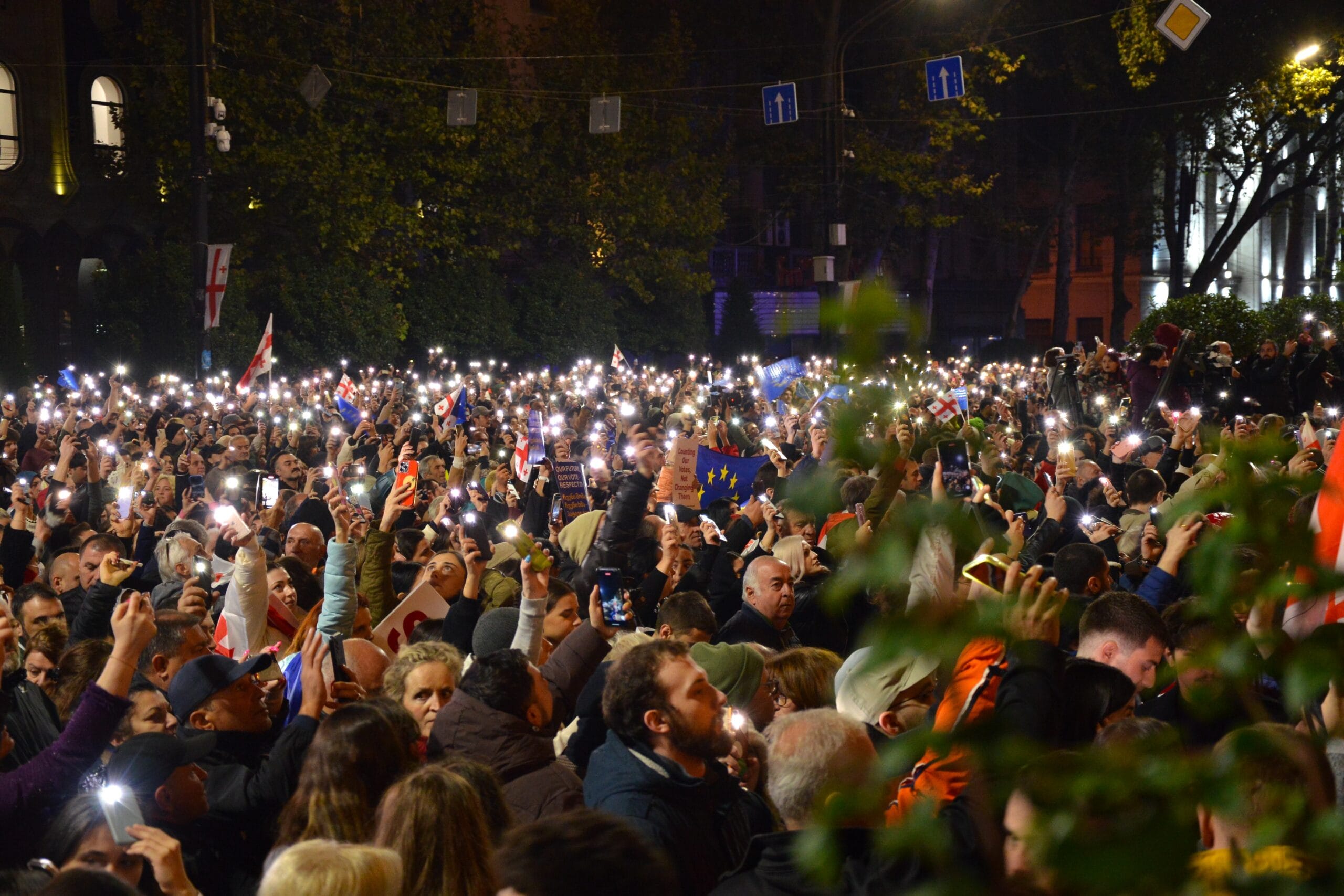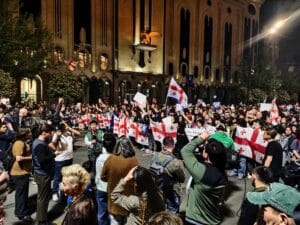(Source: Wikimedia Commons)
Over the past decade, Georgia has undergone a silent but profound transformation. Once regarded as a democratic frontrunner in the South Caucasus, the country now faces an authoritarian backslide that threatens the very foundations of its justice system. The ruling party, Georgian Dream (GD), has consolidated control not only through elections but through a systematic capture of the judiciary, turning it into a tool for punishing dissent and protecting those in power.
This development is not merely domestic; it carries direct consequences for Georgia’s European trajectory, for civil society, and for the credibility of EU values in the region.
As a member of Georgia’s Movement for Social Democracy (MSD) explained in a recent interview, “since independence, Georgia has never experienced a truly independent judicial system.” What distinguishes the current period under Georgian Dream, however, is the depth of institutional control and the speed with which it was achieved.
From Reform Promises to Institutional Capture
When Georgian Dream came to power in 2012, it rode a wave of popular discontent with the outgoing United National Movement (UNM) government, promising to depoliticize the justice sector. For a brief period, modest reforms were introduced. Yet, as the MSD member recalled, “after one or two years in power, more and more concerns were raised… there was no strong political will to really depoliticize the judicial system.”
By 2016–2017, it had become evident that these reforms were largely cosmetic. Instead of dismantling the old structures, GD had rebuilt them under new control. Through its dominance of the High Council of Justice and the appointments process, the government entrenched a loyal network of judges who ensure political obedience in exchange for job security.
“There are many reasons why they remain in the system,” the MSD member explained. “If there is a political interest in a case, they know they have no chance to resist. Those who have tried were either dismissed, transferred, or punished.” Judges’ professional survival, their families’ welfare, and their economic dependence all bind them to the ruling power. “They remember the methods of punishment… they still remember what it means to go against political leadership.”
The result is a judicial system that operates independently only in apolitical cases. When activists, opposition figures, or journalists are tried, outcomes are preordained. The courts have become instruments of selective justice that disguise political persecution as legal procedure.
Political Prisoners and the October 4 Elections
The local elections of October 4 marked a decisive moment for Georgia’s democracy. Official results once again delivered victory to Georgian Dream, but widespread allegations of vote-buying, intimidation, and misuse of state resources triggered immediate protests across the country. Thousands gathered in Tbilisi and regional cities to demand transparent results and an end to GD’s political dominance.
In the days that followed, dozens of demonstrators and opposition activists were detained. Many were charged with “disorderly conduct”, “resisting law enforcement” or “plotting to overthrow the government”, while others faced criminal investigations designed to intimidate and exhaust them financially. These arrests added to an already growing list of political prisoners, underscoring how the judicial system functions as an extension of the ruling party’s political machinery.
Fragmentation and the Need for Civic Ownership
The endurance of Georgia’s protest movement is striking, but it also exposes the weakness of a fragmented opposition. Ideological divisions and a lack of coordination have limited the ability of activists and political leaders to build a coherent front against authoritarianism.
Rather than trying to merge every opposition force into a single party, the Movement for Social Democracy calls for a deeper shift in political culture. The focus should not be on organisational unity, but on political consciousness. Citizens must see how their everyday grievances, such as corruption, inequality, unemployment, and lack of social security, are linked to the erosion of democracy. Only when social and economic struggles are recognised as part of the same political crisis can a broader, more inclusive democratic movement take shape.
This argument highlights a fundamental weakness in Georgia’s modern political development: the country’s democracy has remained largely elite-driven and top-down. As the MSD member observed, “Politics has never been built from below.” Real change will require a new model of civic participation, one that starts from everyday realities rather than party headquarters.
Europe’s Strategic Missteps
For years, the European Union has been seen as a key external partner supporting Georgia’s democratic transformation. Yet according to the MSD, Europe’s approach has been delayed, inconsistent, and overly technocratic. “We were begging them to introduce conditionality years ago, when the signs of authoritarianism were already there, but Brussels and other capitals ignored it,” the MSD member said.
By the time EU institutions began considering mechanisms such as suspending Georgia’s visa-free regime in 2024, Georgian Dream had already entrenched its control. Such measures risk hurting the general population rather than those directly responsible for abuses. “It will directly affect the most socially and economically disadvantaged,” the MSD member warned, “and Georgian Dream will weaponize it to claim that Europe is the enemy.”
What the EU and the Netherlands Should Do
Europe’s response to Georgia’s democratic decline should begin by recognising that repression thrives in silence. When judges, prosecutors, and politicians can persecute opponents without consequence, authoritarianism no longer looks like a failure of governance but the normal order of things. The first task for the EU and for the Netherlands is therefore to name what is happening and name who is responsible. Public exposure matters. Sanctions work best not as bureaucratic tools but as moral signals: those who weaponize the law against citizens should not enjoy the privileges of European travel, investment, or respectability.
Yet accountability alone is not enough. Every authoritarian system depends on the exhaustion of those who resist it. Georgian civil society has carried the struggle for democracy for more than a decade, often with little support and constant risk. For many activists, the threat is not only political but deeply personal: losing jobs, facing lawsuits, seeing family members intimidated. This is precisely where Europe’s solidarity must become concrete. Dutch and European funding mechanisms that connect directly with local initiatives, from legal aid groups to independent media and grassroots campaigns, are not charity projects, but democratic infrastructure. Scaling them back now would send the worst possible message: that Europe supports courage only when it is convenient.
Visibility is another form of protection. Authoritarian regimes depend on darkness; they act most freely when no one is watching. When European diplomats attend trials, visit detainees, or appear at peaceful protests, they make the cost of repression higher. Presence creates deterrence. Even symbolic gestures can disrupt the sense of impunity that Georgian Dream has cultivated.
Finally, Europe must look inward. The credibility of its support for democracy abroad depends on the consistency of its values at home and across its foreign policy. Each time EU leaders embrace autocrats in Baku or Budapest, they confirm the cynicism of those who claim that Europe’s principles are flexible. The Netherlands, which has long presented itself as a guardian of the rule of law, is well placed to push for coherence: European partnerships should rest on shared democratic commitments, not on convenience or energy contracts.
From Chilling Effect to Civic Awakening
Despite arrests, court cases, and intimidation, Georgia’s democratic spirit persists. In the wake of the October 4 elections, people continue to gather and speak out. These acts of defiance matter: they demonstrate that civil courage still exists and that the country’s future is not yet sealed.
“The EU should not confuse the government with the people,” the MSD member emphasised. “It is the Georgian citizens who are fighting for democracy.” Supporting them requires more than statements, it demands a coherent strategy that protects democratic actors, prevents further repression, and rebuilds the foundations of the rule of law.
Georgia today stands at a fragile crossroads. Whether it moves toward Europe or sinks deeper into authoritarian isolation will depend on the resilience of its citizens and on Europe’s willingness to stand by them, not only in words but in concrete action.



